Dative covalent - Study guides, Revision notes & Summaries
Looking for the best study guides, study notes and summaries about Dative covalent? On this page you'll find 71 study documents about Dative covalent.
Page 3 out of 71 results
Sort by
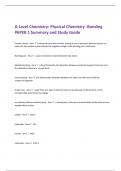
-
A-Level Chemistry: Physical Chemistry -Bonding PAPER 1 Summary and Study Guide
- Exam (elaborations) • 5 pages • 2024
-
- £6.52
- + learn more
Covalent bond - Ans .A chemical bond that involves sharing a pair of electrons between atoms in a molecule, the positive nuclei attracts the negative charge of the bonding pair of electrons Bonding pair - Ans .a pair of electrons shared between two atoms Metallic bonding - Ans .a bond formed by the attraction between positively charged metal ions and the delocalised electrons around them Ionic bonding - Ans .the electrostatic attraction between the cation and the anion hold the compound...
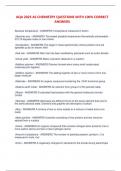
-
AQA AS level Chemistry exam 2024 questions with 100% correct answers
- Exam (elaborations) • 12 pages • 2024
- Available in package deal
-
- £10.60
- + learn more
Nucleons - ANSWERS Protons and neutrons Electrons (location) - ANSWERS Surrounding the nucleus Relative mass of an electron - ANSWERS 1/1840 Strong nuclear force - ANSWERS The way protons and neutrons are held together in the nucleus Electrostatic forces - ANSWERS The attraction between protons and electrons that hold them together in the atom Atomic Number (Z) - ANSWERS The number of protons in the nucleus Mass number (A) - ANSWERS The total number of protons and neutrons in the nuc...
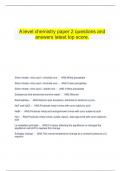
-
A level chemistry paper 2 questions and answers latest top score.
- Exam (elaborations) • 5 pages • 2024
- Available in package deal
-
- £10.44
- + learn more
A level chemistry paper 2 questions and answers latest top score. Silver nitrate+ nitric acid + chloride ions - ANS.White precipitate Silver nitrate+ nitric acid + bromide ions - ANS.Cream precipitate Silver nitrate+ nitric acid + iodide ions - ANS.Yellow precipitate Substances that decolorise bromine water - ANS.Alkenes Electrophiles - ANS.Electron pair acceptors, attracted to electrons e.g H+ NaF and NaCl - ANS.Produces misty fumes wi...
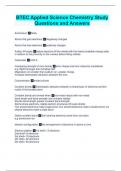
-
BTEC Applied Science Chemistry Study Questions and Answers
- Exam (elaborations) • 4 pages • 2024
-
- £8.15
- + learn more
Ammonium NH4+ Atoms that gain electrons Negatively charged Atoms that lose electrons positively charged Aufbau Principle states electrons fill the orbital with the lowest available energy state in relation to the proximity in the nucleus before filling orbitals Carbonate CO3 2- Comparing strength of ionic bonds Ionic charge and ionic radius be considered e.g. MgF2 stronger than bonding NaF Magnesion ion smaller than sodium ion- greater charge Increase electrostatic attractio...
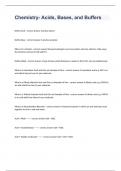
-
Chemistry- Acids, Bases, and Buffers questions and answers graded A+
- Exam (elaborations) • 9 pages • 2023
- Available in package deal
-
- £12.24
- + learn more
Chemistry- Acids, Bases, and Buffers Define Acid - correct answer A proton donor. Define Base - correct answer A proton acceptor. Why is H+ a Proton - correct answer Because hydrogen is just one proton and one electron. Take away the electron and you're left with H+. Define Alkali - correct answer A type of base which dissolves in water to form OH- ions (a soluble base). What is a Monobasic Acid and Give an Example of One - correct answer A monobasic acid e.g. HCl is an acid which ...
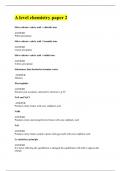
-
A level chemistry paper 2
- Exam (elaborations) • 8 pages • 2024
-
- £8.55
- + learn more
Silver nitrate+ nitric acid + chloride ions ANSWER White precipitate Silver nitrate+ nitric acid + bromide ions ANSWER Cream precipitate Silver nitrate+ nitric acid + iodide ions ANSWER Yellow precipitate Substances that decolorise bromine water ANSWER Alkenes Electrophiles ANSWER Electron pair acceptors, attracted to electrons e.g H+ NaF and NaCl ANSWER Produces misty fumes with conc sulphuric acid NaBr ANSWER Produces misty and orange/brown ...
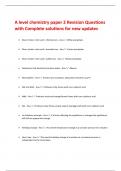
-
A level chemistry paper 2 Revision Questions with Complete solutions for new updates
- Exam (elaborations) • 6 pages • 2024
-
- £6.52
- + learn more
Silver nitrate+ nitric acid + chloride ions - Ans .White precipitate Silver nitrate+ nitric acid + bromide ions - Ans .Cream precipitate Silver nitrate+ nitric acid + iodide ions - Ans .Yellow precipitate Substances that decolorise bromine water - Ans .Alkenes Electrophiles - Ans .Electron pair acceptors, attracted to electrons e.g H+ NaF and NaCl - Ans .Produces misty fumes with conc sulphuric acid NaBr - Ans .Produces misty and orange/brown fumes with conc sulphuric acid NaI - A...
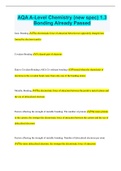
-
AQA A-Level Chemistry (new spec) 1.3 Bonding Already Passed
- Exam (elaborations) • 10 pages • 2023
- Available in package deal
-
- £8.15
- + learn more
AQA A-Level Chemistry (new spec) 1.3 Bonding Already Passed Ionic Bonding The electrostatic force of attraction between two oppositely charged ions formed by electron transfer Covalent Bonding A shared pair of electrons Dative Covalent Bonding (AKA Co-ordinate bonding) Formed when the shared pair of electrons in the covalent bond come from only one of the bonding atoms. Metallic Bonding The electrostatic force of attraction between the positive metal cations and the sea of delocalised electro...
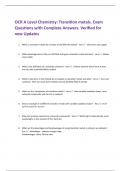
-
OCR A Level Chemistry: Transition metals. Exam Questions with Complete Answers. Verified for new Updates
- Exam (elaborations) • 5 pages • 2024
- Available in package deal
-
- £4.48
- + learn more
1. Which 2 transition metals do not have a fully filled 4s orbital? - Ans .Chromium and copper 2. What advantage does a fully or half filled shell give a transition metal and why? - Ans .Makes more stable 3. What is the definition of a transition element? - Ans .D-block element which form at least one ion with a partially filled d orbital 4. Which 2 elements in the d block do not qualify as transition metals and why? - Ans .Zinc and scandium. Their ions have full d orbitals and not part...
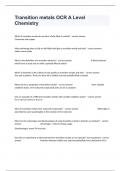
-
Transition metals OCR A Level Chemistry Comprehensive Exam With Questions & Correct 100% Verified Answers
- Exam (elaborations) • 5 pages • 2024
- Available in package deal
-
- £10.60
- + learn more
Which 2 transition metals do not have a fully filled 4s orbital? - correct answer Chromium and copper What advantage does a fully or half filled shell give a transition metal and why? - correct answer Makes more stable What is the definition of a transition element? - correct answer D-block element which form at least one ion with a partially filled d orbital Which 2 elements i...

Did you know that on average a seller on Stuvia earns £76 per month selling revision notes? Hmm, hint, hint. Discover all about earning on Stuvia


